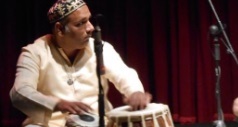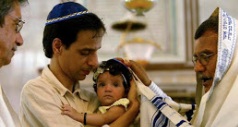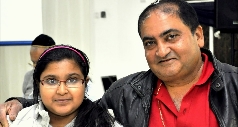ETZ HAEEM PRAYER HALL (1924)
19, Umarkhadi, 2nd Cross Lane
Balu Changu Patil Marg
(near a landmark city juvenile prison and the J. J. Hospital)
Mumbai
Maharashtra, INDIA
This is an active and friendly congregation and fully-functioning prayer hall where weekly Shabbat Saturday and other services are held. Visitors are welcomed, and they will likely be invited to the Oneg Shabbat after the morning service for a meal and singing. At other times, a staff member is fairly regularly on duty at various hours and days to receive visitors and allow them to look around. To arrange for a certain visit, contact the prayer hall representative, David Pezarkar at 992305371. He and the Muslim caretaker can be seen in the picture below.
This prayer hall was founded in 1888 by the Bene Israel (Children of Israel) social worker and educator, Haeem Samuel Kehimkar, in conjunction with Mumbai’s Israelite School. Later renamed Sir Elly Kadoorie School in honor of its benefactor, it survives today as an in part Jewish-run institution at Shivdas Champsi Marg in the Byculla East, Tadwadi, Mazgaon area of the city. Kehimkar, who served as school president, secretary, and treasurer, provided his students prayer services, offered spiritual guidance on religious issues, organized a choir, initiated publications in the local Marathi language on Judaic subjects, rendered monetary assistance to the school, and helped disadvantaged pupils with their expenses.
Shortly after Kehimkar’s death in 1908, the prayer hall was moved from the school property to its current location at Balu Changu Patil Marg, 19 Umerkhardi, 2nd Cross Lane near a landmark city juvenile prison and J. J. Hospital in a crowded mixed residential and commercial area of Mumbai. At that time, it became an autonomous congregation for Bene Israel Jews living in this section of the city. Despite its relocation, the prayer hall continued to follow its original mission by contributing donations to institutions catering to the Jewish educational, particularly to the needs of underprivileged children.
Etz Haeem (Tree of Life in Hebrew) is located on the upper floor of this three story building dating to the turn of the last century (fairly new when the prayer hall moved in) that otherwise contains residential apartments. A sign identifying the prayer hall has been posted for decades above the center windows at the front façade of this cut stone building with a hipped roof covered in flat Mangalore clay tiles. A centered opening, which was originally flanked by pilasters and capped by a shallow vaulted pediment akin to the traditional Indian architectural form of a chatri yet in the 1990s was covered over with red granite in a prayer hall beautification effort, leads from the street into a hallway bisecting the building and to a stair to the rear. An iron gate at the stair on the middle level and name and donation plaques mark the entrance to the prayer hall. In addition to the sanctuary, Etz Haeem has a narrow foyer, office, and a small support space used for washing and storing shoes (removed as per Bene Israel synagogue tradition).
The intimate sanctuary, although a modest space, is nicely furnished and fitted out. Like all synagogues throughout India, Etz Haeem contains a raised centrally-positioned tebah (bimah/reader’s platform with table where the Torah is read) that is surrounded by long freestanding wooden benches. In synagogue fashion, the wooden and brass tebah is draped by a parochet, or a special fabric that covers this important liturgical element. The corners of the tebah are marked with rimonim (finials) and lights. Surrounding the tebah in front of the heckal (ark) are small Oriental carpets made in India that dress up the space. Since this is a single-story, small-scaled room, the women’s section to the east side is little and divided by a mechitzah, or traditional partition separating the genders according to Orthodox synagogue convention. Positioned next to the wall closest to Jerusalem as per synagogue custom is the heckal, or ark. Flanking the heckal are special draped chairs dedicated to the prophet Elijah and the brit mila, or circumcision ceremony.
At Etz Haeem, the wooden heckal with its traditional curtain is not engaged to the wall but an independent cabinet. Above the heckal is a beautifully hand-painted panel dating from 1930 with Hebrew verses, and above that are the Jewish Commandments. Painted wood casement windows with transoms (and security bars) and paneled french doors surround the sanctuary, with has pale yellow chunam (plaster of polished lime and sand) walls and a white marble floor with gold marble border. The walls are decorated with Hebrew prayer verse framings, religious art, clocks, and various Jewish objects, including a menorah (candelabra) and hanukkia (holiday candelabra). The sanctuary has a high ceiling (a pair of parallel tray-shaped forms) and exposed painted white wooden rafters supported by a painted large metal beam. This ceiling configuration provides an open and vertical dimension to what is otherwise a compact space. Hanging from the ceiling structure, in Indian building tradition that includes its synagogues, is a variety of glass dome, chandelier, and metal lighting fixtures. Among these is the brass ner tamid (a light that always burns that serves as a symbol of God's eternal presence), a special fixture found in all synagogues that is commonly placed in front of the heckal. Also hung from the ceiling, in typical Indian fashion, are ceiling fans to ventilate the space.
To help supplement the cost of maintaining and operating Etz Haeem over the years, the small congregation has relied not only on donations but the proceeds from adjacent rental property owned by the prayer hall for decades. Prayer services are held very early in the morning at Etz Haeem for the congregation numbering a few dozen people, and visitors are always invited. Since the prayer hall has never had a rabbi, the religious services have always been led by members of the congregation. At the time this plaque was installed, Etz Haeem was under the guidance of a dedicated Board of Officers. For more than a century-and-a-quarter, Etz Haeem has been an active and vital religious and social institution in Mumbai, and it is hoped that this tradition will continue for years to come.
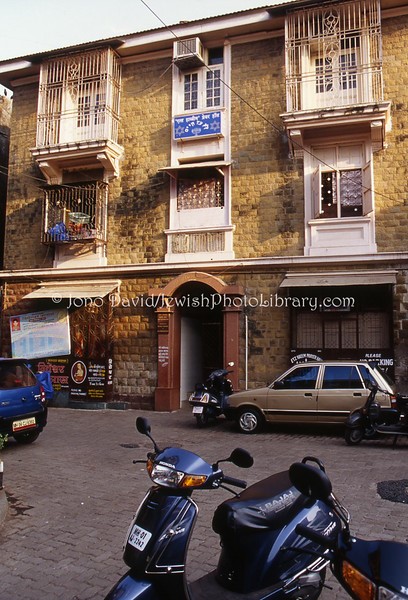
Exterior
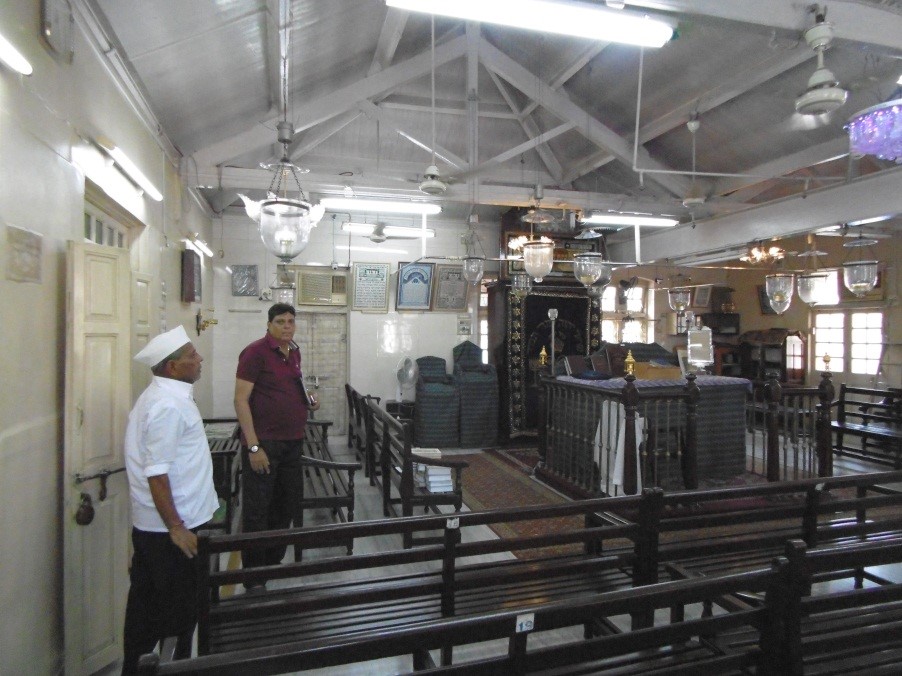
Interior

